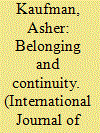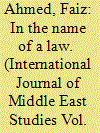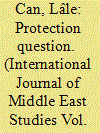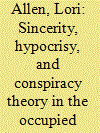|
|
|
Sort Order |
|
|
|
Items / Page
|
|
|
|
|
|
|
| Srl | Item |
| 1 |
ID:
147889


|
|
|
|
|
| Summary/Abstract |
Do public policy debates between activists from different ideological camps in a nondemocratic and illiberal system bridge social divisions or deepen them? Focusing on three controversies regarding family law in Jordan, we argue that activist groups rarely talk to each other in public, and when they do, their discourses aim primarily at mobilizing support within their own camps rather than addressing each other's concerns. Through media analysis, discourse analysis, and in-depth field interviews, we find much polarization and few attempts to build bridges, but also limited though very suggestive exceptions. Those exceptions rely less on public and democratic mechanisms and more on entrepreneurial state actors working quietly, talking opportunistically to each side, and emerging as powerful institutional actors. Authoritarian states can provide sites of deliberation, but deliberation seems to lead to principled agreement beyond the platitudinous only when an institutional actor within the state takes the initiative to get involved.
|
|
|
|
|
|
|
|
|
|
|
|
|
|
|
|
| 2 |
ID:
147882


|
|
|
|
|
| Summary/Abstract |
This article analyzes spatial perceptions and practices of Druze citizens of Israel before, during, and after the Israeli occupation of South Lebanon in 1982−2000. It argues that the opening of the Israel–Lebanon border in 1982 and its closing in 2000 had three effects: it generated internal social, political, and cultural changes within the community in Israel; it changed the relationship of the Druze with the State of Israel; and it reestablished strong ties with their coreligionists in Lebanon and Syria. Drawing insight from the field of border studies, the article shows how Druze citizens of Israel live concomitantly in state and suprastate spatial scales, forming a third, integrated or hybrid, spatial scale. The article proposes using the concept “hybrid spatial scale” as a tool for studying communities such as the Druze that operate on multiple territorial scales.
|
|
|
|
|
|
|
|
|
|
|
|
|
|
|
|
| 3 |
ID:
147884


|
|
|
|
|
| Summary/Abstract |
In 1919, a new amir in Afghanistan named Aman Allah Khan launched an ambitious campaign to reorder his government into a constitutional monarchy. By 1923, Afghanistan had ratified its first constitution, supplemented by scores of legal and administrative codes. Whereas the latter have long been attributed to European borrowings or Kemalist imitation, this article uncovers two neglected features of Aman Allah's reformist project to argue that the making of Afghanistan's 1923 Constitution presents a distinctive path of state building in the region: Islamic legal modernism. First, by upholding the Hanafi school of Islamic jurisprudence as the basis of Afghan substantive law, Amir Aman Allah sought a cohesive national judiciary through the codification of fiqh, not European civil law. Second, by synthesizing the expertise of a diverse cast of Muslim scholars and professionals—from Afghan clerics to Ottoman and Indian technocrats recruited to Kabul—he attempted to avert a rift between “Islamic” and “secular” lawmaking.
|
|
|
|
|
|
|
|
|
|
|
|
|
|
|
|
| 4 |
ID:
147887


|
|
|
|
|
| Summary/Abstract |
This article examines the impact of the Ottoman Empire's battle against legal imperialism on the status of Central Asians in its domains, specifically after the promulgation of a nationality law in 1869 that classified them as foreigners. It traces how the threat of Muslim colonial subjects attaining European consular protections led to the emergence of a “Central Asian protection question”: whether Afghans, Bukharans, and Chinese Muslims had legitimate claims to European legal nationality and, by extension, capitulatory privileges. Through a number of case studies, the article shows how the Ottoman Foreign Ministry fused international legal norms and pan-Islamic claims to arrive at the position that Central Asians from informally colonized lands were not “real” subjects of European empires, and that they were under the exclusive protection of the caliphate. This strategy, I argue, undermined the creation of an Ottoman citizenship boundary and opened up a complex field of inter- and intraimperial contestation about who was a foreigner. In contrast to positive associations with legal pluralism in this period, Central Asian migrants and pilgrims who were protected by the caliph but not recognized as Ottomans or European subjects found that they could not benefit from practices such as forum shopping and affiliation switching. And while the notion of foreignness remained subject to multiple and conflicting interpretations across the empire, I argue that nationality as a legal category was incontrovertibly becoming a defining feature of these foreign Muslims' rights and status in the sultan's domains.
|
|
|
|
|
|
|
|
|
|
|
|
|
|
|
|
| 5 |
ID:
147888


|
|
|
|
|
| Summary/Abstract |
Concerns about lying and sincerity in politics are common in most societies, as are concerns about conspiracy theories. But in the occupied Palestinian territory, these concerns give rise to particular kinds of effects because of the conditions of Israeli occupation. Political theorists often interpret opacity claims and conspiracy theories as responses to social disorder. In occupied Palestine, disorder and instability are standard. Opacity claims and conspiracy theories therefore require a different kind of analysis. Through an examination of the semiotic ideology of sincerity, especially as it has emerged in the conflict between Fatah and Hamas, this article argues that opacity claims act as a form of nationalist pedagogy, at once reinforcing the basic principles of sincerity of action and word, and encouraging a wariness of political spin.
|
|
|
|
|
|
|
|
|
|
|
|
|
|
|
|
|
|
|
|
|